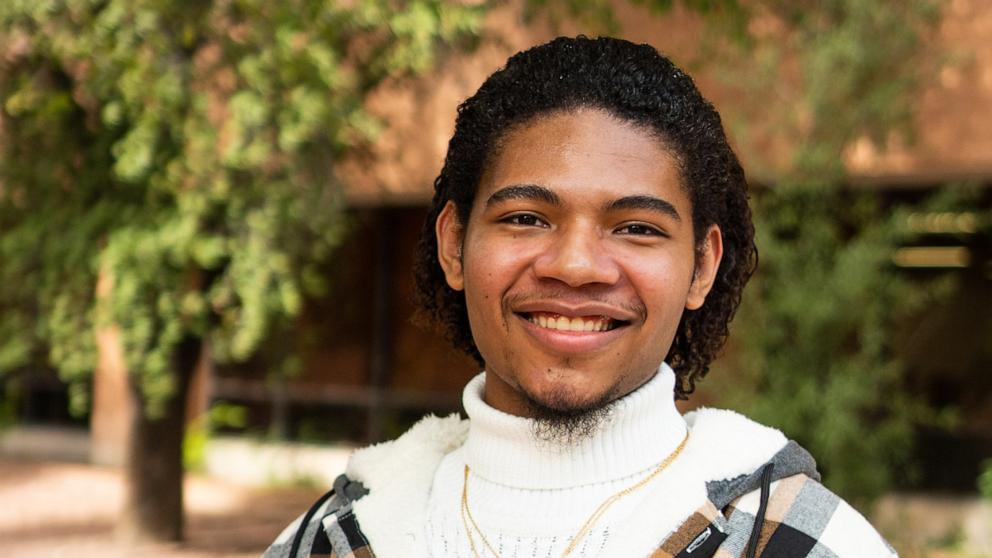


An 18-year-old has graduated from Arizona State University with a bachelor's degree in neuroscience, despite a lifetime of challenges that included homelessness and leukemia.
Dallas Salas was born on February 1st, 2005. At the age of five, he was diagnosed with leukemia.
Speaking to "Good Morning America," he recalled living through the moments, sharing, "It was truly a wrenching and heartbreaking experience. I remember staying up at nights and just crying and just screaming."
2010 was also the same year Salas and his family lost their Scottsdale, Arizona home to arson, an experience he described as traumatizing.
"So I was out in California because we were taking a family trip. And we came home, we actually knew about it, because some neighbors called us and [we] came home, everything was destroyed," he said. "And it was pretty intense."
Raised mostly by his mother, Salas said his dad was never really around when he was growing up and is currently incarcerated for "engaging in criminal activity." Although he is still in touch with his dad, whom he said is set to be released in 2026, Salas described his relationship with him as "pretty lackluster."
MORE: Mother-daughter duo graduate college togetherIn terms of his health, Salas said he recently learned that his leukemia has gone into remission after his bone marrow biopsy came back clear of the disease.
Salas told "GMA" that the pain he experienced from the early-age leukemia diagnosis, in addition to some other family medical history, served as inspirations for him to pursue his education in the science and medical fields.
"When you get into any aspect of biology or any aspect of medicine, you are deep-diving into the human systems," he said. "I definitely want to be a hands-on approach, helping other people deal with these issues and implement those systems that we learn about."
Despite navigating his life's challenges, Salas continued working toward his goals, with help from his support system.
"So my mom was a great motivator, she really inspired me to keep it going," he said.
Salas also credited his success coach, Kristen Rund, whom he said was one of his "main motivations, along with my mom."
"We would meet every week…And we would go over my plans, we would go over what to do next…so that I can succeed," he said. "And she was one of the first people, or if not the first person, that I talked to about the neuroscience program at ASU."
Salas' mom, Constance, told "GMA" she began to notice Salas' intelligence when he was a little kid.
"All the time, he outsmarted me each and every time and I'm like, 'wait a minute, he's not like the others,'" she said, referring to her other children. "So I raised him the same way that I raised them, however, with a stronger, more rigorous curriculum for parenting because his brain could take it."
"I would give him assignments and he would bring them back really fast," she said.
In addition to his academic success, Constance said she hopes Salas will also use his talents to help others in need.
"He's always been passionate about the children that end up on the border in the camps. And so I look forward to seeing him stand up for those children…stand up for discrimination, stand up for rights," she said. "I look forward to seeing him help people. I look forward to successful brain surgeries… so it's going to be interesting. Watching him save lives, and make the world a better place."
When raising Salas, Constance said she kept him "in a bubble" as a way to protect him from their family's challenges.
"It's things that you can do to keep them involved and, and keep them focused, because they don't necessarily have to be a part of what's going on in their surroundings," she stated. "And they can be stress-free for a while, and then it's beneficial in the long run."
Another person who helped mentor Salas during his time in college was his supervisor, Xavier Celaya, who is a doctoral student at ASU.
Discussing his experience working with Salas, Celaya said, "I feel like one of the biggest traits that are kind of indicative of a student's success is their eagerness to learn and willingness to learn, not necessarily ease of learning, but just the amount of energy that they put into that type of process. From the get-go, Dallas was an exemplar of this trait."
"Whenever he didn't understand something he would always ask for clarification, which is a trait not a lot of students have. And to have mastered it at such a young age, and so refined, is really something," he added.
Celaya said one of things that Salas was able to improve upon during their time working together is his "research literacy."
"Just kind of how you talk about research," he said. "You know, there's just so many different caveats and details that go along with it. And so kind of fine-tuning the way that you think about it, and subsequently communicate it is really kind of tough, but Dallas worked at it, and see improvements by the end of our time together."
Asked if he had encountered any other students like Salas, Celaya replied, "Oh, no, not at all."
"Dallas' ambition is truly unmatched as far as, like any of the students that I've had the opportunity and pleasure of working with, during my time as a graduate student," he explained. "They said he's just like an extremely bright star, you know, shining through, and can't wait to see where that takes him."
When it comes to his motto in life, Salas stands by what he believes.
"If you're going through a lot of chaotic experiences, life is only 10% what happens to you and 90% of what you make of it," he declared.